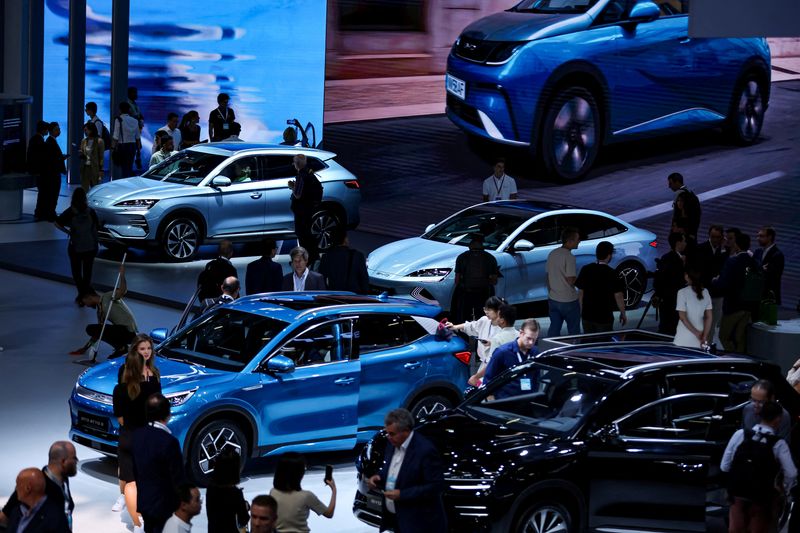
By Philip Blenkinsop and Nick Carey
BRUSSELS (Reuters) – EU countries are wavering over whether to back additional tariffs on Chinese-built electric vehicles, highlighting Brussels’ challenge in building support for its largest trade case yet as Beijing threatens wide-ranging retaliation.
Germany, whose carmakers made a third of their sales last year in China, wants to stop the tariffs, according to a government source, while France has been among the firmest backers.
But a majority of countries are still weighing the pros and cons of the escalating trade spat, according to an informal poll by Reuters of EU governments.
The issue will be put to members in an advisory vote in the coming weeks, the first official test of support in a landmark case for the Commission. The EU initiated the probe without an industry complaint, the first such trade case of this kind.
The bloc is set to confirm on Thursday provisional duties of up to 37.6% on Chinese brands such as BYD, Geely and SAIC, as well as on China-made models of Tesla, BMW and other western automakers.
EU members will also vote in October if the Commission proposes multi-year tariffs at the end of its investigation. These would be blocked if a “qualified majority” if at least 15 countries representing 65% of the EU population votes against them.
France, Italy and Spain, with 40% of the EU population, have indicated they would back tariffs.
“Europe must defend itself if our companies are harmed and do not compete on equal terms,” Spain’s economy ministry said.
However, the Czech Republic, Greece, Ireland and Poland were still debating the issue, official and government sources said, while Belgium has a caretaker government and the Dutch only got a government this week.
NEGATIVE EFFECTS
Germany has stressed the need for a negotiated solution with Beijing. Its automakers have said tariffs are the wrong approach, with the negative effects outweighing any benefits.
Increasing the cost of EVs for consumers undermines the EU’s goal of being carbon-neutral by 2050, opponents say. Tesla has said it will hike prices.
Beijing’s retaliation could bring extra tariffs on EU exports of cognac, pork or luxury cars.
The Commission says duties are needed to counter cheap loans, land and raw materials and other subsidies and the goal is a level playing field, not shutting Chinese car makers out, as the United States’ planned 100% tariff is likely to do.
Tariffs could also give the EU leverage in negotiations with Beijing and push producers to make cars in the EU.
Hosuk Lee-Makiyama, director of thinktank the European Centre for International Political Economy, said clear majorities either way could embolden tariff opponents or supporters. He added final positions at the end of the investigation will depend on what Beijing offers in negotiations.
“If we go to a vote then, it means negotiations have failed,” he said.
The EV investigation could just be the start for the EU as it toughens its stance on Beijing, as its green and tech companies trail global rivals, interviews with half a dozen trade experts show.
They point to a 712-page updated report on Chinese state interference and subsidies released in April as the strongest sign yet that Brussels means business.
The document is by far the most extensive undertaken by the Commission, showing it has learned a lesson from an investigation into Chinese solar panels a decade ago, when it did not impose tariffs and the EU’s own industry collapsed.
It offers proof to back its assertions that China does not play by the same rules and includes research into a wider range of industries, beyond traditional ones such as steel, including semiconductors, telecom equipment and renewable energy.
That leaves the door open to future cases.
“This is a report to set the scene and show how and why Europe is changing its policies,” said Alicia Garcia Herrero, a senior fellow at Brussels-based economic thinktank Bruegel. “To be frank, it’s also a message especially for the German chancellery.”
(Reporting by Philip Blenkinsop and Nick Carey; Additional reporting by Leigh Thomas, Jan Lopatka, Belen Carreno, Sarah Marsh and Renee Maltezou; Editing by Josephine Mason and David Holmes)
EMEA Tribune is not involved in this news article, it is taken from our partners and or from the News Agencies. Copyright and Credit go to the News Agencies, email news@emeatribune.com Follow our WhatsApp verified Channel





